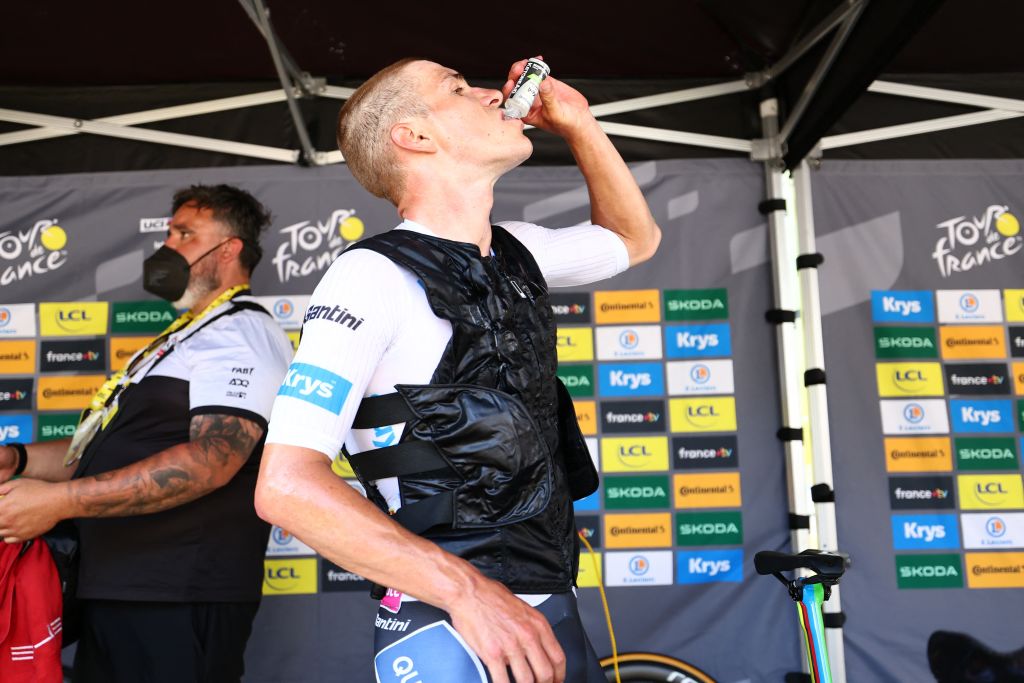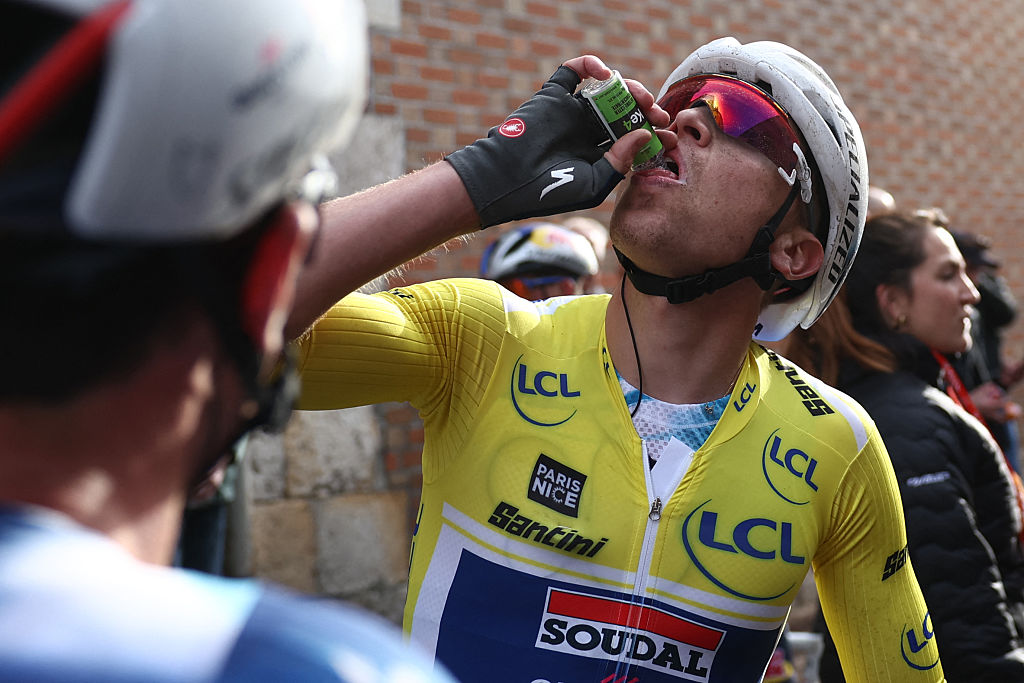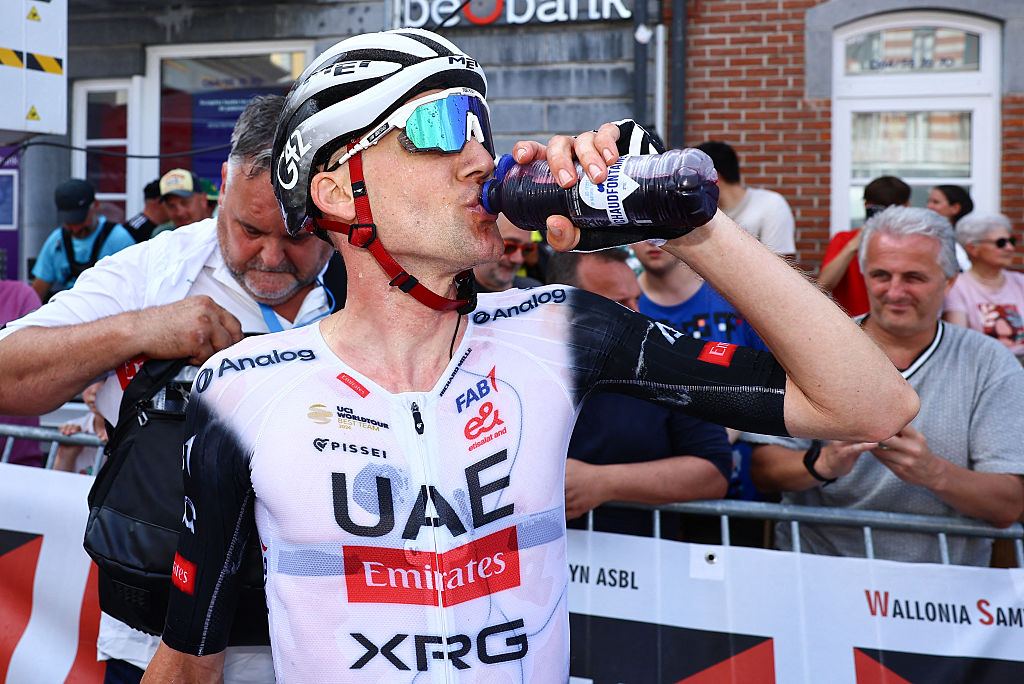UCI ketones statement only introduces more anti-doping grey areas, the exact thing cycling doesn't need – Opinion
Recommending against certain products or practices but not banning them blurs the line in a sport where the boundaries need to be clear

On Monday, the UCI did something very unusual. They issued a press release on the issue of ketones, finally weighing in on the supplement that has been causing consternation and conversation in cycling for at least five years, once touted as a performance 'wonder drink' and now slightly more doubted.
As the sport's governing body, which literally writes the rules about everything to do with cycling, it's not unusual for the UCI to weigh in on what riders and teams are allowed to do. But what was unusual about Monday's statement was the content of it.
The rule-making body neither gave the green light on ketones, which are still legal under WADA, nor set out any intent to legislate against them. They simply said that they "[see] no reason for them to be used" and "does not recommend the inclusion of such supplements in riders' nutritional plans".
Now, as far as I'm aware, there are no products that the UCI does recommend in riders' nutritional plans, not water nor caffeine nor literal essential vitamins. What legal products or supplements riders should or shouldn't use has never been the business of the governing body, who deal in rules and regulations over dietary recommendations.
The reason ketones have entered the UCI's consciousness is because, more than just a nutritional supplement, they have been considered as part of the anti-doping conversation.
Initial research into ketone supplements – which add to the levels of naturally-occurring ketones in the body – showed they could significantly aid performance and recovery, and even boost EPO response in the body. With these kinds of claims, many were concerned that the product might cross the line into being too performance-enhancing.
That's a line that all sport is always trying to navigate, because of course almost all the supplements athletes take are for the purpose of enhancing performance, but there is a line between improving natural ability, and giving an unfair, unnatural advantage.
The latest race content, interviews, features, reviews and expert buying guides, direct to your inbox!
Now, since ketones first came to prominence, with many riders adopting their use, the consensus has changed. The efficacy of the product has been questioned in later studies, and some of the teams that used ketones subsequently stopped, finding – of their own accord – that the benefit wasn't worth it.
Weirdly, it's on this basis that the UCI has recommended against their use. Not because they think ketones are akin to doping, or because they have been seen to have any harmful effects, but because they just don't think they work. Which isn't usually something that the UCI would weigh in on – again, as a colleague pointed out to me, they've never come out and said multivitamins aren't worth taking, or weighed in on how effective nasal strips are.
Monday's statement was an unusual step from the UCI, but more than just being strange, it was possibly even counterproductive in the fight against doping and the push to make cycling more trustworthy.
Grey areas don't help the fight against doping
The MPCC (Mouvement Pour un Cyclisme Crédible), an independent body that teams and riders sign up to and they set stricter rules on anti-doping, aiming to make the sport more credible and eliminate the grey areas when it comes to performance enhancement.
They routinely 'ban' things that the UCI or WADA don't, allowing teams to subscribe to a supposedly more credible ethos. They have been talking about ketones for years, and in 2024, they officially added the product to the list of things their members are not to use.

For the MPCC, this is about clearly defining the line between fair and unfair performance enhancers. They don't want grey areas or room for interpretation; they want clear rules that are the same for everyone so the sport is fair and credible.
At the time of making their decision on ketones, they criticised the UCI for still not taking a stance on the product and leaving a potential grey area.
"We cannot accept such long delays, given the public health issues at stake and the credibility of our sport," the MPCC said.
"The managers and referring doctors of the MPCC member teams are seeing their positions, those guided by caution, weakened by an endless wait for clarification and a clear position. Either the UCI is certain that the use of ketones is acceptable and must make this known in a clear and precise communication. Or it is not and must state loud and clear that the institution does not recommend their use, or even that it prohibits it."
The UCI had said at the time that they were going to announce the results of an "impact assessment of ketones on health and performance" at the end of 2025.
Many assumed this meant they would carry out their own research or at least a thorough, evidence-based assessment, because surely reading some studies does not take a year. But, reading only what they put in their press release, it doesn't really seem like they did much more than look into existing research.

Whatever they did, the UCI did come to a conclusion about ketones, and – perhaps because they'd promised to do it, or because of the pressure on them – they published that conclusion. And in many ways, they did what the MPCC asked for and recommended against their use.
But in reality, this does exactly what the MPCC works against: it created a grey area. Non-MPCC teams and riders are still completely free to use ketones, according to WADA, but they're not recommended by the UCI. The UCI may think that by coming out against them on grounds of a lack of efficacy makes it okay – they aren't suggesting that they're akin to using doping products – but the nuance is likely to be forgotten easily. People won't remember that, but they'll remember that the UCI is against ketones.
Instead, the issue of ketones being seen as a doping-adjacent, morally murky product is only going to continue. Teams that aren't part of the MPCC are likely to continue making their own decisions on the product, as they do with everything from what a rider has for breakfast to what medicines they take, so a UCI statement isn't going to actually change anything materially, but it does darken the perception of the products.
The statement opens up teams that do keep using ketones to more criticism and skepticism. They'll be seen as doing something that the governing body sees as bad, which adds to the belief among many that cycling is always pushing the limit with doping, and often going over it. It turns something that is currently perfectly legal into a questionable behaviour.
If the UCI thinks a product should be banned, they should say that. If they don't think it gives an unfair advantage, they could say that too. A middle-of-the-road, vague position helps no one and changes nothing.
Grey areas are the reason why cycling got into such a dark place with doping, as nefarious figures have always tried to exploit those blurred boundaries as much as possible, whilst those who want to follow the rules do, and get beaten by performance-enhanced athletes.
If the UCI is serious about wiping out doping – which it obviously should be – these grey areas need to be eliminated as much as possible. Rules should be rules, in one direction or another, not recommendations.
Matilda is an NCTJ-qualified journalist based in the UK who joined Cyclingnews in March 2025. Prior to that, she worked as the Racing News Editor at GCN, and extensively as a freelancer contributing to Cyclingnews, Cycling Weekly, Velo, Rouleur, Escape Collective, Red Bull and more. She has reported from many of the biggest events on the calendar, including the Giro d'Italia, Tour de France Femmes, Tour of Flanders and Paris-Roubaix. She has particular experience and expertise in women's cycling, and women's sport in general. She is a graduate of modern languages and sports journalism.
You must confirm your public display name before commenting
Please logout and then login again, you will then be prompted to enter your display name.
